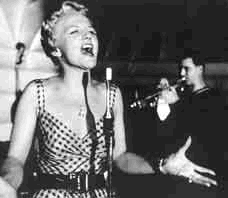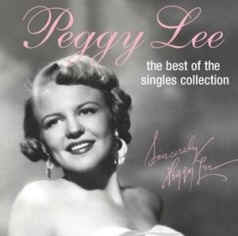
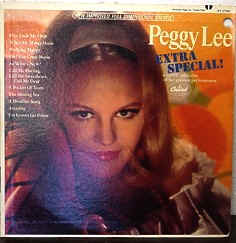
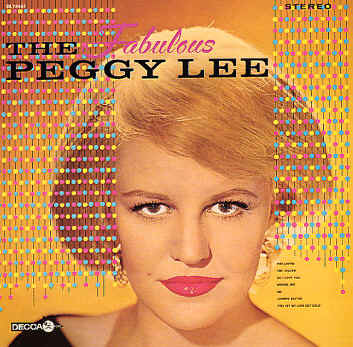
 Geri
Allen
Geri
Allen
Today, it is almost the norm for singers to write their own songs, but in the 1940s when there was a proliferation of music coming out of Tin Pan Alley, Broadway and Hollywood, it was not. Not until Peggy Lee, who was the first famous singer-songwriter.
She wrote with her husband, guitarist Dave Barbour. One of her first songs, "What More Can a Woman Do?", written in 1945, was soon recorded by another young singer named Sarah Vaughan. Sarah recorded this with some guys named Charlie Parker and Dizzy Gillespie. This song also became the album title and hit R&B single for another great singer, Big Maybelle.
Peggy's first big songwriting hits, in 1946, were "I Don't Know Enough About You" and "It's a Good Day," which was later used as one of the opening numbers in the Susan Hayward film, With a Song in My Heart, about the life of singer Jane Froman. Then in 1948 she wrote "Mañana," which topped the charts for nine weeks and was Capitol Records' biggest hit single by a singer-songwriter until the Beatles (and then it took four men!).
In the 1950s, while continuing to write hit singles, she began writing for motion pictures. In 1952, Peggy wrote "How Strange," her first song for a motion picture, the Robert Stack/Virginia Grey movie The Bullfighter and the Lady.
In 1953 she wrote "This Is a Very Special Day" for the remake of the movie The Jazz Singer, in which she co-starred with Danny Thomas. That same year she wrote a mood poem, "New York City Ghost," which she performed at the Hollywood Bowl to orchestra music composed by Victor Young, the composer of "Around the World in 80 Days" and her collaborator at the time.
Then in 1954, Peggy wrote a song for the Tony Curtis movie The Rawhide Years, the title song for the Joan Crawford movie Johnny Guitar, and the song "I Love You So" for the Shirley Booth movie About Mrs. Leslie.
Lady and the Tramp followed in 1955 -- Peggy's first complete score for a movie. That same year she was nominated for an Academy Award for her performance in Pete Kelly's Blues, and an Emmy for best female singer on television.
The following year she wrote the theme for the Ethel Barrymore/Carolyn Jones movie Johnny Trouble, and four songs for the movie Tom Thumb (1958), including "Take a Little Time to Smile."
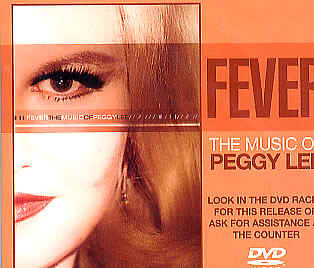
1958 was also the first year of the Grammy Awards and her hit "Fever," for which she wrote new lyrics, was nominated for four Grammys, including Song of the Year, Record of the Year and Best Vocal. (She received eight more vocal nominations by 1969, the year she won for "Is That All There Is?" by Jerry Leiber and Mike Stoller.)
She continued to write for both singles and motion pictures. With Duke Ellington she wrote "I'm Gonna Go Fishin'" for the movie Anatomy of a Murder. Then in 1961, with Harold Arlen, she wrote "Happy with the Blues" for a television special on Arlen's music. ("Happy with the Blues" became the title of Arlen's biography.) Later came songs for the Jane Fonda movie Joy House (1964), the Carl Reiner movie The Russians Are Coming! The Russians Are Coming! (1966), the Cary Grant movie Walk, Don't Run (1966), the Alan Arkin movie The Heart Is a Lonely Hunter (1968), the Charles Bronson movie Rider on the Rain (1971), and The Nickel Ride (1974).
It therefore came as no surprise that in 1983, when she was to appear in a musical on Broadway about her life, entitled simply Peg, Peggy herself would write the score.
Additionally, Peggy has almost always included one or more original songs on nearly every one of her dozens of albums, and in 1990 released an entire compact disc, There'll Be Another Spring: The Peggy Lee Songbook, consisting of songs she wholly or partly composed (including five new compositions).
Although she wrote the music for a number of these compositions, Peggy usually writes the lyrics, and has collaborated with such fine composers as Dave Barbour, Victor Young, Harold Arlen, Willard Robison, Duke Ellington, Quincy Jones, Cy Coleman, Johnny Mandel, Dave Grusin, Robert Farnon, Francis Lai, Sonny Burke, Paul Horne, Jack Marshall, Marion McPartland, Lalo Schifrin, Michel Legrand, Dick Hazzard, Hubie Wheeler and Bob Schluger.
Artists in almost every field of music, from R&B singer Big Maybelle to opera singer Julia Migenes, have recorded Peggy's songs, including Ella Fitzgerald, Judy Garland, Nat "King" Cole, Mel Tormé, Tony Bennett, Sarah Vaughan, Bing Crosby, June Christy, Della Reese, Dionne Warwick, Jack Jones, Perry Como, Dean Martin, Cleo Laine, Nina Simone, Sammy Davis Jr., Annie Ross, Eileen Farrell, Jack Teagarden, Elvis Presley, Blossom Dearie, The Mills Brothers, Jonah Jones, Nellie Lutcher, Chris Connor, Mark Murphy, Mose Allison, Barbara Lea, Michael Feinstein, Holly Cole, k.d. lang and Madonna.
These compositions have withstood the test of time. Peggy's 1948 recording of her composition "Don't Smoke in Bed" (which she credited to Willard Robison to help his daughter financially) opened the Jack Nicholson movie The Two Jakes. A 1966 composition, "The Shining Sea," was recorded by Eileen Farrell on her 1992 CD It's Over, and a 1983 composition, "Angels on Your Pillow," from the Broadway musical Peg, was included on Michael Feinstein's 1992 CD, Pure Imagination.

.jpg)
